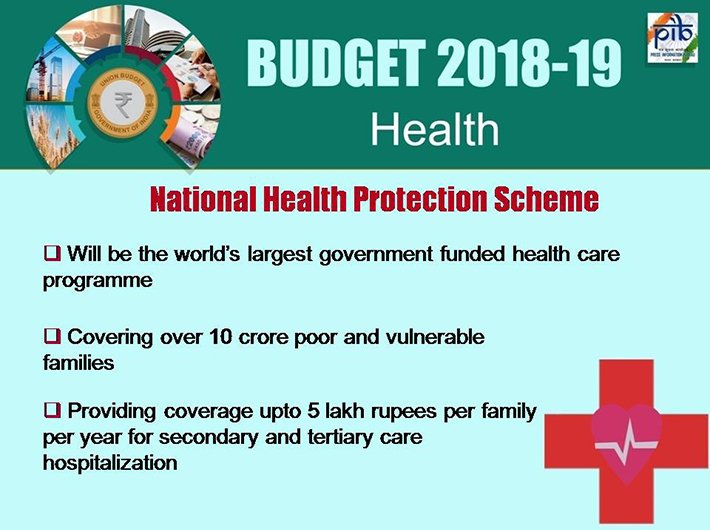4.21 percent of India’s population is pushed below poverty line due to out-of-pocket expenditure on health.
The budgetary allocation for health has increased by 11.5 percent this year. It has increased to Rs 52,800 crores in 2018-19 from Rs 47,353 in 2017-18.
Government in the budget 2018 has taken health care to an aspirational level. It has given insurance cover of Rs Five lakh to 50 crore poor people as a part of new health protection scheme under the Ayushman Bharat initiative. He called it the largest government funded programme in the world.
Under the new scheme, the ongoing Rashtriya Swasthya Bima Yojana (RSBY) that provides insurance cover of Rs 30,000 and other state insurance schemes will be merged to enhance the financial pool.
After coming to power in 2014, the Modi government has shown its inclination towards bringing insurance in public health care sector. It was in 2014, the government floated policy initiative called National Health Assurance Mission (NHAM) aimed at providing free drugs, diagnostic services and insurance for serious ailments for India’s 1.2 billion people. But it wasn’t rolled out due to financial issues.
Meanwhile, RSBY always received flak for its functioning. It is criticised for expanding the market for private health insurance companies at secondary and tertiary healthcare facilities. It also failed in promoting the primary and preventive health care to the lowest income quintiles.
Since health insurance scheme has failed in India, the designing of the new scheme will be crucial. We look at certain sets of issues which the new scheme needs should address. First, how the scheme will address the issue of regulating the private sector that continues to thrive in the unregulated healthcare market? So far, the insurance benefits under RSBY have brought money into the pockets of private insurance companies rather than supporting the poor and vulnerable.
Second, how will it address the issue of poor healthcare facilities in rural and tribal areas where we people are still devoid of treatment due to poor infrastructure and health supply? Third, how will it deal with the inequity in different states? Health experts say it will create disparities in the country. It is expected southern states will be able to implement the scheme in a better way due to their sufficiency on supply side while northern states will struggle due to the poor infrastructure facilities in secondary healthcare facilties.
These issues are important to address due to rising health care expenditure in the country. As per the 2011 data by World Health Organisation, 4.21 percent of India’s population is pushed below poverty line due to out-of-pocket expenditure on health.
Other announcements:
-- Implementing National Health Policy 2017, Rs 1,200 crore announced for the 1.5 lakh wellness health centres in the country
-- Rs 600 crore for nutritional support of Tuberculosis patients
-- Rs 500 will be provided to each TB patient undergoing treatment.
-- 24 new government medical colleges

